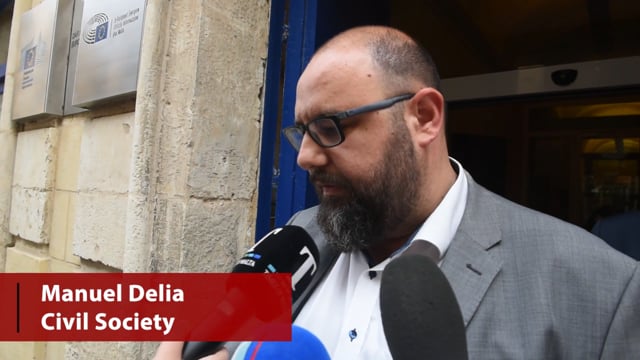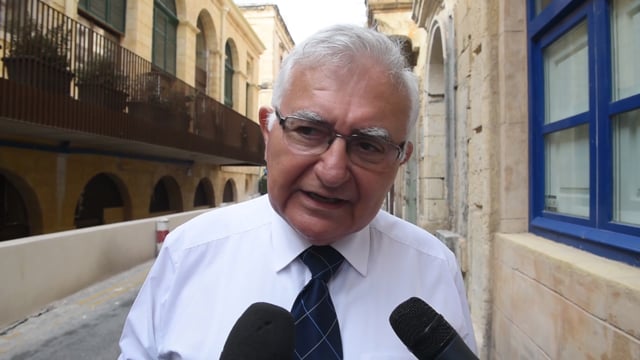[WATCH] MEPs claim Caruana Galizia investigation ‘has stalled’ with arrests of killers
MEPs meet PL, PN and PD MPs in follow up visit to last year's European Parliament ad-hoc delegation Malta


MEPs Ana Gomes, Sven Giegold and David Casa who met with government and Opposition MPs today have highlighted that they are "disturbed" with the pace of the investigation into Daphne Caruana Galizia's murder, which seems to have stalled with the arrest of three people suspected of planting the bomb.
They also said it was very worrying that Magistare Anthony Vella, who was conducting the inquiry into the murder, would now have to pass the case on to someone else after being touted for the position of judge.
The MEPs also emphasised their concern towards reports published by the Daphne Project that government minister Chris Cardona had been seen drinking with one of the suspects in the Caruana Galizia murder, and that the suspects might have been tipped off by a police officer who was part of the unit investigating the crime.
The MEPs Ana Gomes, Sven Giegold and David Casa said that it was evident that the government was distracting attention from the core issue - that of the rule of law, by talking about other fringe matters. They said that the issues which emerged in the Panama Papers and later through the work of journalists in the Daphne Project have led to no effective prosecution and parliamentary or police action.

"This is a massive failure of the rule of law in Malta," Giegold said, "There has been no institutional response. When you have strong allegations of corruption, in no other EU country would [Tourism Minister] Konrad Mizzi and [the Prime Minister's Chief of Staff] Keith Schembri stay in office."
"This is the core of the issue, don't get distracted and concentrate on the rule of law. All things, such as financial services and iGaming depend on the country's reputation. All these sectors can go elsewhere if Malta loses its reputation," he said, with Gomes adding that there was "tremendous concern" on the impact the Panama Papers and Daphne Project revelations were having on the island's banking system.
Gomes also revealed that Moneyval, the Council of Europe's anti-money laundering and terrorism watchdog, showed concern regarding what had transpired in Malta after they analysed the first report drawn up by the MEP delegation which had visited Malta in February last year.

The MEPs also met with former Nationalist minister John Dalli, who said he had requested the meeting to clear up various lies and accusations which had been made in his regard.
Calling the meeting "very entertaining", Casa said that he had referred to Caruana Galizia as "that blogger", something nobody should do.
"At least show some respect," Casa said. "Dalli tried to accuse us of lying about him in the report we drew up on our first delegation visit to Malta in February last year, when we had also met with Caruana Galizia. All of what we wrote was based on information which was in the public domain, and which quotes OLAF investigations. We all know Dalli went to court and lost the case against him, and we know he was supposed to be arraigned in Malta by a former police commissioner, but this did not happen after there was a change of government."
Nationalist Party meeting
In comments to the Malta Independent, Nationalist MP Kristy Debono said that PN members had discussed the financial services industry and the effects reputational risk were having on it. She said they also highlighted institutions’ loss of autonomy.
PN MP David Stellini told the newspaper that his discussion had focussed on the rule of law in Malta, and the impunity demonstrated through the lack of action by institutions, in the face of allegations against people high up in government.
The party also spoke with the MEPs on the importance of enforcing anti-money laundering regulations.
Democratic Party meeting
The Democratic Party said that it had emphasised the need for "change from within" in their meeting with the three MEP, as well as the need to strengthen institutions and to do away with the social and professional pressure put on people to stay in line and depend on those with power.
"The Maltese nation has shown throughout its history that it can deal with decadence in its governance standards, internally, but is very appreciative of EU support at this very delicate stage in its history, when it is known that big business interests and bludgeoning by powerful social media instruments are having their toll on democracies worldwide," PD said after the meeting.
It said it reiterated to the MEPs that the lacunae in Malta's constitution and the ineffectiveness of our institutions must be addressed by Maltese with urgency.
"Partit Demokratiku welcomes the expertise of the EU delegation and wishes Malta to always strive to be a respected, equal partner in Europe and with the rest of the world," the party said.
"The European Parliament is encouraged to work closely with different representatives of the Maltese nation, for the benefit of Malta as well as for the collective European project anchored in tje rule of law, democracy, social justice and solidarity," it added.
Labour Party meeting
In a statement, the Labour Party said a delegation from its parliamentary group had accepted to meet the three MEPs who it said were in Malta to investigate what was going on in the country on their own personal initiative. MPs Edward Zammit Lewis, Robert Abela, Stefan Zrinzo Azzopardi, Clayton Bartolo, Rosianne Cutajar and Byron Camilleri were present for the meeting with the MEPs.
"The MPs explained to Ana Gomez and Sven Giegold, that a lot of the issues being referred to are nothing other than rumours or half truths. They also stressed that there were magisterial inquiries underrway that, in a country that respects the rule of law, must be allowed to be completed," the PL said.
It added that the MPs had expalained the number of changes that had been implemented in the past months, "in order for the country to become a more modern one, with stronger institutions".
The PL added that Gomes and Giegold were accompanied by David Casa, "the person leading the Nationalist Party's campaign against against Malta".
What MEPs recommended to Malta after their November 2017 visit:
- Persons perceived to be implicated in serious acts of corruption and money laundering, as a result of Panama Papers revelations and FIAU reports, should not be kept in public office and must be swiftly and formally investigated and brought to justice. Keeping them in office affects the credibility of the Government, fuels the perception of impunity and may result in further damage to State interests by enabling the continuation of criminal activity.
- Work is needed to ensure stronger checks and balances in the Maltese legislative framework to better separate powers and to limit possible interference of the Prime Minister in the judiciary and the media; an assessment of media pluralism and independence from political power should be conducted.
- The functions of Chairman of the MFSA and the function of promoting investments into Malta should be decoupled;
- Reform the Attorney General functions, to decouple the role of advisory to the government from the role of prosecution;
- Reform the Judiciary, namely on the basis of recommendations made in 2013, in order to reinforce the separation of powers and the independence of the Judiciary;
- The Police Commissioner should no longer be appointed by the Prime Minister but by an appropriate independent body. Similarly, the veto power of the Prime Minister should no longer exist regarding the nomination of the Maltese Chief Justice;
- The Whistleblower Protection Act should be revised to cover workers in the public sector. Mr Ferris should be granted police protection and serious consideration should be given to his application for protection under the Whistleblower Protection Act;
- The Maltese Government should separately publish the list of persons being granted Maltese Citizenship under the Individual Investment Programme and should start an independent assessment of this programme and of the anti- money laundering procedures applied to it;
- The Maltese Government should start an action programme against corruption and financial crime and increase the number of investigations and prosecutions. This should include special units in police and judiciary with sufficient and highly qualified staff;
- Civil society organisations and any Maltese citizens should be encouraged to provide evidence and bring formal complaints to the Police forces, FIAU and MFSA, regarding white collar crimes and money laundering in Malta, in order to trigger criminal investigations.
- An investigation is needed over the alleged influence of elections through increased hirings in the public sector, issuance of construction permits and regularisations of irregular constructions, as well as pay increases and promotions in the military
- An investigation is needed on allegations of the smuggling of Libyan petrol;
- Reassess the importance for Malta joining the EPPO in order to work together with participating MS against EU fraud and other crimes affecting the Union' financial interests.
Read also:
MEPs concerned about rule of law in Malta following fact-finding mission
Key findings from the European Parliament's report on rule of law in Malta








.jpeg)

.jpg)








